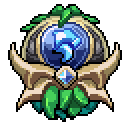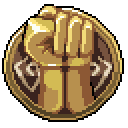Magic
What IS magic?[edit]
Magic in the world of Verdict is very straightforward. To put it simply, it's any case where someone uses mana to make something happen. This can be a fireball, this can be stopping time, this can be anything in-between. If it uses mana, it's magic. That doesn't really answer the depth of the question, though: what IS magic? What is it made out of? Can I feel it? Is it all around us, or just inside?
The (likely annoying) answer is: it depends! So let's go through some of the basics and understand the fundamentals before we address any of the more complicated stuff.
What is mana?[edit]
Mana is the building block that composes all things, in a manner of speaking. Our world is made up of many elements and their aspects, and the mana we use to cast magic can be viewed as a package filled with a plethora of said elements & aspects. When we want to cast a fireball, we take our mana and "unpackage" it, rearrange those aspects into the desired fireball, and throw it at our opponent.
Most things don't have mana in this sense. They're simply composed of these aspects- rocks, for example, or plants, don't have a "mana pool", but could be turned into mana if you found some way to distill them into their magical components. The same can be said for most animals, but there are exceptions, and you're one of them!
If they don't have mana, why do I?[edit]
There are a few reasons: You have a soul! Creatures, including you, have a soul that gives you many benefits. One of said benefits is that you generate mana just by existing. You're intelligent, and can therefore train your own ability to generate mana if you so choose. You're fairly powerful! By plant standards, at least. You need a lot of mana to keep yourself running, so you tend to have excess. Of course, these things aren't necessarily something you have to focus on, or even something you ever will focus on. Humans generate mana simply by existing, as mentioned, so it's purely optional whether you opt into trying to expand upon this facet of your existence.
Alright, I have mana. How does mana become magic?[edit]
Good question! Put simply, the mana that normally sits dormant in your leylines (vein-esque pathways that connect your body to your soul) can be drawn out into the real world if you're talented enough. This mana can then be used to manipulate your environment! Great stuff. How much you can draw, how much you have to draw from, what you do with it, and so on? These are all questions for how you'd like to handle being a mage.
The Schools of Magic[edit]
Long ago, around 700AC, humanity discovered that magic was not just conjuring fireballs and shaking the earth. To those with talent, there were other paths available, many of which allowed for vastly more interesting techniques to arise. These techniques diverged and became what we now know as the Five Schools, each with their own opinions and knowledge on the art of magic.
 Elementalism[edit]
Elementalism[edit]
Elementalism is the root of most magic. It is the simplest form to access as an aspiring mage, and thus many mages proceed to this path without even considering the other four. While it was the first to unfold in Rhyst, though, it is not at all the most limiting or limited. Since 700AC, Elementalism has expanded vastly in every direction. Where before a masterful Pyromancer would own at best a handful of fireball-related spells, now a Pyromancer of the same tier may conjure explosions or liquid fire from their fingertips instead.
It is unique in that, unlike most Schools who have split themselves down the middle, Elementalism has instead split into four equal disciplines: Pyromancy, Aquamancy, Geomancy, and Aeromancy.
 Weaving[edit]
Weaving[edit]
Weaving is a step beyond traditional Elementalism. Where a Geomancer conjures earth and may derive metal or magma upon greater learning, Weaving is the art of combining elements in such a complex manner that they start to look like something else entirely. The best example of this is the absurdly difficult practice of Arcanery, or more specifically the practice of Arcane Magic. Arcane Magic is the combination of all four elements, resulting in a pure, almost mana-like energy capable of feats of incredible power. Arcane mages are among the most gifted and/or talented, yet they frequently lack endurance due to the excessive amount of studying required for their field.
On the other hand of the School of Weaving, you have Druidry. Much like Arcanery, it is a complex mix of multiple elements in one- primarily earth and water, but occasionally with influence from fire and wind for more advanced spells. They're known to be connected beyond compare to nature, and their magic revolves around using that connection to their advantage. They can create nonsentient life on a whim from their mana, which cleanly separates Druidry from the same tier as other magic.
 Battlemastery[edit]
Battlemastery[edit]
Battlemastery is the art of empowering your weaponry with mana and other types of magic. It is split down the middle into Bow- and Blademastery, each of which takes a different stance entirely in combat. Bowmastery, despite its name, also includes some extraneous groups of armaments like throwing knives and other projectile weaponry. It fixates on empowering the projectiles themselves, and talented Bowmasters can even conjure poisons, blights, and elemental afflictions to coat their arrowheads. They are notoriously swift and viciously frustrating to catch due to their propensity for high dexterity physiques.
Blademastery, on the other hand, isn't as cohesive. Blademasters are known to use any number of weapons to achieve their goals, ranging from spears and swords to axes and even hammers in some extraneous cases. Their dexterity is typically high, but many praise the value of strength instead; in either case, their force is one to be reckoned with. Most fixate on drawing blood from their targets or empowering the weight of their weapons to excessive degrees.
 Augmenting[edit]
Augmenting[edit]
Augmenting is the least developed of all existing Schools of Magic thus far, but it'd be a mistake to call it undeserving of a title as one of the five. Augmenters are those who empower their bodies and physicality with mana and magic, becoming monstrously strong and tanky behemoths that cannot be taken down with mundane weaponry alone. This is most commonly classed as Berserking. While Berserkers must still wield weapons and armor to match the best mages in combat, they tend to need them less, and no mage serves better without such tools than a Berserker in their prime.
Theories exist that claim far-off lands may bear extensions of Augmenting, focused on self-healing and physical, hand-to-hand combat. Some think these techniques may soon leak into the world of Rhyst...
 Sorcery[edit]
Sorcery[edit]
If Elementalism is the art of unpackaging a box of blocks and creating a fireball from said blocks, Sorcery is the art of hurling the entire box at your opponent. Among novice Sorcerers, this is as complex as it gets: you're merely firing mana wholesale at your target in a demonstration of extremely inefficient but similarly powerful magic. And for many years following this level of expertise, its methodology doesn't change much. However, once you approach a degree of mastery, it expands into a much greater talent encompassing complicated mana manipulation, Blood Magic, and even some Fae and Void Magic.
It is commonly organized into two categories: Witchery, which deals with Blood and Blight Magic, and Incanting, which deals with the closest approximations of Fae and Void Magic we humans can manifest. Witches are renown for their ability to manipulate the mana latent in human bodies before it is made manifest, making them adept at controlling existing life and degrading it. Incanters, on the other hand, specialize in manipulating existing magic, and are exceptional in the pursuit of controlling other mages' magic as well as denying it.
Incompatible with evocation.
 Evocation[edit]
Evocation[edit]
Harnessing the raw power of Rhyst. This world and its plane become one with the mage, and them with it. Fueled with faith and hope, a mage can manifest the might of human will.
Incompatible with sorcery.
Powerscale[edit]
Verdict has a variable powerscale and as we proceed, mages will (contextually) get stronger. As such, this section will likely have to be updated, so keep that in mind when reading. In any case!
Amateur Mage[edit]
(Level 0 - 10, Rank E)
Amateur mages are capable of very minor feats of magic. Typically, an amateur mage can handle one spell every so often before running out of excess mana. These spells are rarely capable of affecting the world around them.
Conjuration: Weak. Candleflames, soapbubbles.
Enhancement: Very mild strength/speed enhancement.
Force: Next to none, not enough to strongly influence a human.
Novice Mage[edit]
(Level 20 - 30, Rank D)
Novice mages are those which have made some concerted effort to grow magically, outside of a few exceptions. Typically, a novice mage can upkeep spell-casting continuously, but their spells are still rather weak and have difficulty influencing the world.
Conjuration: Substantial. Fist-sized balls of fire, puddles of water.
Enhancement: Capable of making themselves nimbler and stronger to an extent.
Force: Meager. Enough to knock someone over (or out, with a good shot).
Experienced Mage[edit]
(Level 40 - 50, Rank C)
Experienced mages have substantial training and can recall numerous spells at once. They are capable of casting several spells on-end without exhaustion for a while. Their spells are starting to get dangerous.
Conjuration: Very substantial. Cannonball-esque balls of fire, waves of water.
Enhancement: Capable of significant upgrades to near-superhuman speed and strength.
Force: Dangerous. Enough to injure someone if you aren't careful.
Adept Mage[edit]
(Level 60 - 70, Rank B)
Adept mages are in a class of their own. They are rare to be sure and are known to have an arsenal of spells at their disposal. At this point, spell-casting becomes expensive enough that becoming more skilled doesn't typically mean you can cast for longer periods of time.
Conjuration: Impossible to miss. Walls of fire, pools of water.
Enhancement: Capable of brief but massive upgrades to blinding speed and strength.
Force: Very dangerous. Easily capable of killing if care isn't given.
Expert Mage[edit]
(Level 80 - 90, Rank A)
Expert mages are very powerful, often capable of tackling substantial threats entirely on their own (or at least holding them at bay). They are approaching archetypes and will typically maintain a theme that they perform best in.
Conjuration: Beyond compare. Car-sized bombs of fire, floods of water.
Enhancement: Capable of absurd upgrades to near-instant speed and mighty strength.
Force: Weapon-like. It's hard to claim fireballs at this tier aren't intended to kill if given their full strength.
Master Mage[edit]
(Level 100+, Rank S)
Master mages are those which shape generations. They are mighty beyond comparison and, with allies, can oft match pace with beings from other planes or monsters that've grown too far.
Conjuration: Masterful. House-sized bombs of fire, field-drowning floods of water.
Enhancement: Masterful. Capable of fine-tuning their speed and strength to whatever degree they prefer.
Force: Masterful. A mage at this tier is definitively dangerous at all times and is capable of causing great harm to many at once.
